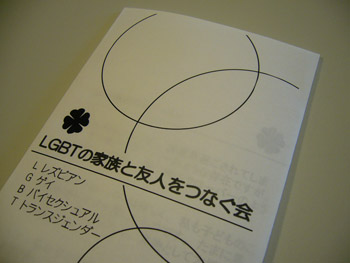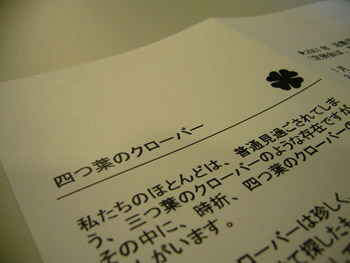Izumi NIKI
CGS staff member
【The article below is the same as the article that appears in the tenth issue of the CGS Newsletter.】
 Suppose that your daughter, son, mother, father, or anyone in your family all of a sudden came out to you saying they were lesbian, gay, bisexual, or transgender. How would you respond to it? Shock, confusion, denial, distress... We still live in a society in which LGBTs are often misunderstood. Families are usually astounded and confused by the news of their loved one’s deviant sexuality, and sometimes refuse to accept it. The Association for Families and Friends of LGBTs has been working to create a community-based space for families and friends of LGBT people. I interviewed Kansai member Ms. Naomi Shimizu and Kanto members Ms. Ryoko and Mr. Takeshi Kobayashi about their experience as parents of LGBT children and their involvement in the organization.
Suppose that your daughter, son, mother, father, or anyone in your family all of a sudden came out to you saying they were lesbian, gay, bisexual, or transgender. How would you respond to it? Shock, confusion, denial, distress... We still live in a society in which LGBTs are often misunderstood. Families are usually astounded and confused by the news of their loved one’s deviant sexuality, and sometimes refuse to accept it. The Association for Families and Friends of LGBTs has been working to create a community-based space for families and friends of LGBT people. I interviewed Kansai member Ms. Naomi Shimizu and Kanto members Ms. Ryoko and Mr. Takeshi Kobayashi about their experience as parents of LGBT children and their involvement in the organization.
The history of the organization can be traced back to 2006 when Shimizu’s son came out to her. She says, “my son was still in high school in January 2006, when he told me that he was gay. The only thing I had ever learned about homosexuality was that it was a temporary phase in the developmental stages between narcissism and heterosexuality. I first thought that maybe he was imitating one of the senior students and that it would not last long. But when he explained to me in detail, I was astounded.”
“But even more surprising was the situation for LGBT people. My son’s coming-out was, of course, something new and unexpected, but it sort of made sense. I am not a very feminine person, either. So I thought it made sense. What got me, though, was that our society is very difficult for LGBTs, according to a book my son gave me as well as his story about his past suicidal attempts. I immediately realized, “gosh, they are suffering so much, I have to do something.” From then on, Shimizu started to notice every bit of injustice pertaining to LGBTs; she says, “about two days after my son told me he was gay, I saw an animation on TV in which the bad character was an okama (a vague, derogatory term for a homosexual, drag queen, transgender, transvestite, etc. which can be used to refer to basically any effeminate man). They said in the show that the “Great Satan” was an okama. The okama Satan wore body hair and makeup. I had always watched the show, I even liked it. So I was shocked. I wondered, when my son and I had watched the show together long time ago, did he receive the message that LGBT people were bad, something to laugh at? I thought, we should stop this, this is all wrong, I have to do something.”
 “My initial question was, ‘how come we don’t know much about LGBTs?’ We, the parents, as well as our children themselves who are LGBTs, are shocked, confused, because we don’t know. I went to talk to education committees, human rights advocacy groups, etc., because I believed that this was something that should be taught in school, but none of them knew anything about LGBT issues. Not only the school receptionists, but even a human rights advisor who had once been a high school teacher told me that they had never had a student like that.”
“My initial question was, ‘how come we don’t know much about LGBTs?’ We, the parents, as well as our children themselves who are LGBTs, are shocked, confused, because we don’t know. I went to talk to education committees, human rights advocacy groups, etc., because I believed that this was something that should be taught in school, but none of them knew anything about LGBT issues. Not only the school receptionists, but even a human rights advisor who had once been a high school teacher told me that they had never had a student like that.”
When Shimizu began to search for other parents in similar situations to whom she might be able to talk, she realized that there was no group for families of LGBTs in Japan. She says, “our children can go to the Internet and make friends with other LGBT people, but, I realized, many of their parents found it difficult to find a place to share their experience. Many of us, and our children, are shocked and confused, but we never had an opportunity to get together and talk about it. I thought we really needed a place to gather. I immediately contacted LGBTs whom I had read about and asked them to let me meet their parents. In April 2006, we had our first meeting with six or seven parents. The next meeting welcomed another mother, who had so much to share with us that she could not help shedding tears. That's how our group started.”
Another shocking experience hit Shimizu when she tried to have LGBT students from colleges and universities introduce her to their parents and found out that “only a small number of the students had come out to their parents.” She says, “indeed there were a few but they only came out because their parents had found out. And they said, ‘everyone in my family looks at me as if they were looking at something dirty,’ ‘it is a taboo topic in my family,’ and ‘they act like they didn’t hear.’ I was shocked. Those young people were not only oppressed in society but feeling lonely at home! One of the important roles that our association plays is to help LGBT children get to know other parents?not their own parents?through monthly meetings where more than half the participants are curious, young LGBT people who want to know when and how to come out to their parents. They ask the parents questions like ‘is it really shocking?’ and ‘would I make my parents sad by telling them they will never see my child’s face?’” What Shimizu always tells those young people is that “it might be very hard for your parents to accept it at first, but you see, there are parents who have accepted it. So, be brave!” because she believes that “parents are parents after all, they will end up being on their child’s side.”
Of course, reality is harsh. It is not uncommon for a parent to have difficulty accepting their child’s deviant sexuality, saying, “I’m trying but I can’t. I just can’t!” Ryoko and Takeshi Kobayashi, two members of the group from the Kanto region, were told by their then 22-year-old daughter four years ago that she wanted to live as a man. “I knew about LGBTs, I thought I knew about it, but when it became an issue in my own family, I was bowled over,” says Ryoko. Now, her mind is way ahead of her heart, as she puts it, which means she can finally understand although it still doesn’t feel right to her. She continues, “I never thought that I raised him in any particular gendered way, but his coming-out made me realize that I had subconsciously raised him as a ‘girl’ for more than twenty years.” Takeshi, on the other hand, says that he “immediately shifted from ‘shock’ to ‘acceptance’ which probably makes me a little different from the norm?maybe fathers and mothers respond to their children’s coming-out a little differently.” But he also says, “since parents have, of course, lived much longer than their children, there’s so much instilled in our minds and it takes time to replace it with new understanding.”
He believes that although it may first seem impossible to accept your child’s deviant sexuality, as you take part in the group’s meetings, meet people in similar situations, make friends and talk more and more about whatever you have to output, it gradually becomes easier, and ultimately a piece of cake, to accept your child just the way they are. “Sei (sex, gender, sexuality) is ‘-sei’ as in kosei (individuality). It is entirely natural that everybody is different,” says Shimizu, “so it should not matter if parents can accept it or not?it is a matter of knowing or not knowing yet another simple fact about their child’s true being.” She continues, “once you know it, you can’t stop learning about it. The same is true for everything else, not only LGBT issues. It is important that young students read, learn, and understand that there is a huge number of minority people in our society and a variety of discrimination out there. If you have friends who are minorities, talk to them, listen to them, about various things.”
Compared to international big cities, the number of marchers in the Tokyo Pride Parade is significantly small. Shimizu hopes that more and more people will participate and start to understand LGBT issues. At the same time, she hopes that our future will not need such a thing as a pride parade because diversity is respected without question. Their association, despite the fact that participants gather around to discuss their concerns, confusion and discomfort, seemed to me that it had some kind of magical power to put a smile on its members’ faces.
Official website >>> http://lgbt.web.fc2.com/
Blog >>> http://blog.goo.ne.jp/family2006/